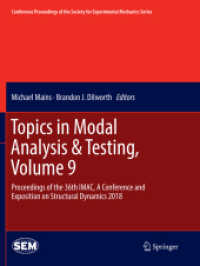Full Description
Superdiverse classrooms, curriculum reforms, the need for alternative, formative assessment methods, sound research to identify student populations at risk, thought-provoking proposals to develop lexical areas and components of intercultural communication skills - these are just a few of the topics that make INTERNATIONAL CURRENT TRENDS IN APPLIED LINGUISTICS AND PEDAGOGY a compelling book for anyone interested in theoretical developments, trends, and examples of good practices and inspiring ideas in the field of applied linguistics, language education and pedagogy. This book includes a collection of engaging pieces of research and reminds us that "education is a form of living and in this respect, it is a daily practice that resides between the spaces of phronesis and theoria" (Baldacchino, in this volume). Global in the results reported and innovative in its suggestions, International Current Trends in Applied Linguistics and Pedagogy paves the way for a better understanding of the direction that language education needs to take in the 21st century -- a century of multiple and multiplying social, cultural and technological challenges. Through a multidimensional and multicultural collection of research, an attempt is made to shed light onto the current diverse context of research, teaching and learning and offer incentives for further investigating and consideration.
Contents
Preface; One Picture Book, Two Languages: Teaching English as a Foreign Language in Chinese Preschools; Early Identification of At-Risk Foreign Language Readers; Promoting Global Citizenship by Raising Intercultural Awareness of Young Language Learners: Perspectives and Practices of English Language Teachers in Serbia; Cross-Linguistic Mediation and Foreign Language Teaching in Europe: The Case of the METLA Project; Engagement during Peer Interaction in the Primary English Classroom; How to Implement Self-Assessment to Assist Childrens Language Learning; Assessment Practices of EFL Teachers in Croatia: How Do We Go About Young Learners?; Perceptions and Attitudes towards Assessment: Focusing on the Use of Portfolios in Formal and Informal Secondary Education in Greece; Mapping the BIG Picture: Curriculum Mapping as a Reflective Tool; Pain Language and Educational Implications in Childrens Lives; To Speak Something out of Existence: Impossible Pedagogies and the Art of Unlearning; Teaching to Unlearn: Stereotypes in the Intercultural Communication Class; Translation in Foreign Language Pedagogy; English Teacher Trainees Views on Their Preparation for Special-Needs Classrooms From the Perspective of Time; Studying Decontextualized Language by Means of a Word Definitional Task in Monolingual and Bilingual Learners with Dyslexia; Dissociation Between Pragmatic Abilities in High-Functioning Greek-Speaking Learners with Autism Spectrum Disorders; Index.








